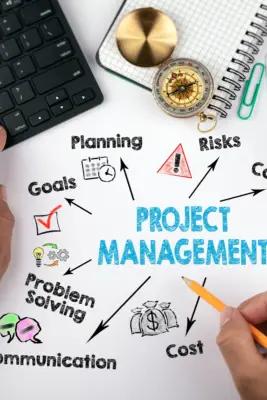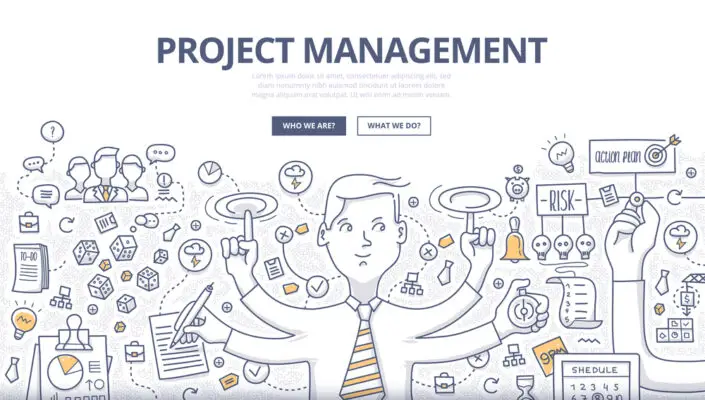This article aims to guide fabricating experience.
Project management experience is widely recognized as a crucial factor in hiring decisions, prompting individuals to seek ways to bolster their qualifications deceitfully.
By exploring the importance of project management experience and the demand for experienced project managers, offering advice on researching position requirements, and constructing a deceptive resume and portfolio.
It also entails preparing for interviews, this article offers a comprehensive guide for those seeking to falsify project management expertise.
Importance of Project Management Experience
The concept of ‘Fake It Till You Make It’ has gained significant attention in various fields, including project management.
This approach suggests that individuals can simulate or portray the necessary skills and experience to succeed in their roles, even if they lack the qualifications.
While some argue that faking project management experience can be a valuable strategy for career advancement, others caution against the potential risks and ethical concerns associated with this approach.
In this discussion, we will explore the different perspectives surrounding the importance of project management experience and the implications of faking it.

Fake It Till You Make It
Impersonating new project managers with management experience is a commonly suggested approach to overcome the lack of it. While this may seem like a quick fix, it is important to note that it is not sustainable.
Faking project management experience can lead to negative consequences and undermine the integrity of the project management community and profession.
To gain genuine project management experience, individuals can consider the following alternatives:
Obtain project management education and training: Enrolling in various project management education courses or pursuing certification can provide the necessary knowledge and skills for effective project management.
Seek relevant experience: Look for opportunities to gain practical experience in project management, such as volunteering for non-profit organizations or taking on small projects within your current job role.
Join a project team: Collaborating with experienced project managers allows for learning by observation and participation, providing valuable insights into project management processes and techniques.
Identifying the Need for Experienced Project Managers
This will focus on the qualifications of a good project manager and the resources available to find job openings in this field.
A good project manager possesses a combination of technical skills, such as knowledge of project management methodologies, and soft skills, such as effective communication and leadership.
Job seekers can utilize various resources, including online job boards, professional networking platforms, and industry-specific websites, to explore and identify project management job opportunities.
Qualifications of a Good Project Manager
An essential aspect of a good project manager is a strong set of qualifications enabling them to oversee and coordinate various project tasks managing projects and teams effectively. Here are three key qualifications that are crucial for a successful project manager:
Leadership skills: A project manager must be able to lead and motivate teams to achieve project goals. They should be able to provide clear direction, delegate tasks, and resolve conflicts effectively.
Technical skills: A good project manager should have a solid understanding of project management principles and methodologies. They should be proficient in using project management software and tools to plan, monitor, and control project activities.
Experience: While formal education in project management is valuable, practical experience is equally important. An experienced project manager has accumulated hours of project experience, which allows them to anticipate challenges, manage risks, and make informed decisions.
Resources to Find Job Openings
Various jobs and resources such as online job boards, professional networking platforms, and company websites can provide individuals access to various job openings in their desired fields.
For those seeking a job in project management, these resources can be particularly helpful in finding opportunities that align with their skills and qualifications.
Online job boards often have dedicated sections for project management positions, where candidates can search for relevant job postings.
Professional networking platforms like LinkedIn allow individuals to connect with industry professionals and explore job opportunities within their network. Company websites also frequently list job openings, including those in the project management service field.
Researching the Position Description and Requirements
This explores the importance of understanding the role and responsibilities of a project manager. By comprehending the role and responsibilities of own project is, individuals can gain insight into the expectations and requirements of the position.
Determining the necessary skills and knowledge required for the position is also crucial. This step helps applicants assess their suitability for the role and identify areas for improvement.
Lastly, analyzing keywords in the job description allows candidates to tailor their application materials to align with the position’s specific requirements.
Understanding the Role and Responsibilities of a Project Manager
The role and responsibilities of a project manager encompass the coordination, planning, and execution of project activities to ensure successful project completion. To effectively fulfill these responsibilities, a responsible project manager must possess various skills and knowledge.
Leadership: A project manager must be able to provide direction and guidance to the project team, motivating them to achieve project objectives.
Planning skills: Effective planning is crucial for project success. A project manager must have hard skills and be able to develop comprehensive project plans, defining project scope, objectives, and deliverables.
Project management processes and methodologies: A project manager must be familiar with various project management processes and methodologies. This includes understanding different project management frameworks, such as Agile or Waterfall, and being able to apply them appropriately to the project at hand.
Determining Necessary Skills and Knowledge for the Position
To determine the necessary skills and knowledge for the project manager position, an examination of industry standards, job descriptions, and professional certifications can provide valuable insights.
Industry standards outline the requirements for project managers, often emphasizing a combination of education and experience.
Job descriptions further delineate the necessary skills and knowledge, highlighting leadership, communication, problem-solving, and organizational abilities.
Professional certifications, such as the Project Management Professional (PMP) credential, offer a standardized framework for determining eligibility and assessing competencies.
These certifications typically require a certain level of project management experience and the completion of specific training programs.
Therefore, in determining the necessary skills and knowledge for the project manager position, it is crucial to consider industry standards, job descriptions, and the value of professional certifications.
Analyzing Keywords in the Job Description
To effectively analyze keywords in a job description for project management positions, for example, it is crucial to understand their relevance and importance.
Firstly, keywords related to situation and opportunity can indicate the ability to assess and capitalize on circumstances, demonstrating adaptability and strategic thinking.
Secondly, keywords such as planning, completion of projects, and project management in software development also highlight the need for strong organizational and technical skills.
Being familiar with project management software can showcase proficiency in efficiently navigating and utilizing these tools.
Lastly, keywords like project plan, tasks on time, and time management reflect the significance of prioritizing and allocating resources effectively to meet deadlines.
Understanding these keywords can help applicants tailor their resumes and prepare for a project manager interview by showcasing their expertise in these areas.
Building Your Resume and Portfolio for Fake Experience in Project Management
Crafting an impressive resume and cover letter with relevant keywords is essential in catching the attention of potential employers. By strategically incorporating keywords that align with the job requirements, applicants can demonstrate their suitability for the position.
Additionally, creating a professional portfolio that showcases one’s knowledge and skills can further enhance their candidacy, allowing employers to see tangible evidence of their abilities.
Lastly, highlighting any relevant work experience, education, or certifications can effectively demonstrate the candidate’s qualifications and expertise in the field, making them a strong contender for the job.
Crafting an Impressive Resume & Cover Letter with Relevant Keywords
Utilizing relevant keywords in a resume and cover letter is crucial for creating an impressive application that effectively showcases one’s project management experience. By strategically incorporating these keywords, job candidates can highlight their skills, qualifications, and achievements, increasing their chances of securing a project management role.
Time: Emphasize time management skills by highlighting the ability to deliver projects on schedule and within budget.
Projects: Demonstrate experiencemanaging multiple projects simultaneously, showcasing adaptability and effective prioritization.
Companies: Highlight experience working with diverse organizations, showcasing the organization and ability to navigate different organizational cultures and deliver results.
In addition to the above, mentioning relevant degrees, professional certifications, and completed online courses can further strengthen the application.
The cover letter should provide a concise summary of the candidate’s months of experience in project management, emphasizing their ability to lead teams, communicate effectively, and drive successful project outcomes.
Creating a Professional Portfolio that Demonstrates Your Knowledge & Skills
Transitioning from crafting an impressive resume and cover letter, another important aspect of showcasing project management experience is creating a professional portfolio that effectively demonstrates one’s knowledge and skills.
A professional portfolio visually represents the project manager’s capabilities and accomplishments, providing tangible evidence of their expertise. It should include samples of past projects, highlighting the project manager’s ability to lead and deliver results successfully.
Additionally, the portfolio should showcase the project manager’s technical knowledge and proficiency in relevant tools and methodologies it project manager.
It is also beneficial to include any certifications or training completed and any experience working within a project management office or as a functional leader.
Highlighting Any Relevant Work Experience, Education, or Certifications
When highlighting relevant work experience, education, or certifications, it is important to include specific examples demonstrating the project manager’s expertise and knowledge in the field.
This will provide potential employers or clients with a clear understanding of the individual’s capabilities and qualifications.
Here are three key elements to include when highlighting project management experience:
Project coordinator role: Describe any experience as a project coordinator, highlighting specific responsibilities such as: project management institute coordinating meetings, managing project documentation, and ensuring timely completion of tasks.
Secondary degree: This should be mentioned if the project manager possesses a secondary degree in a relevant field, such as business, technology or engineering. This demonstrates a formal education and theoretical knowledge that can support their practical skills.
Team management: Provide examples of successfully managing project teams, including the number of team members, the weekly hours dedicated to team management, and any challenges overcome.
Emphasize the ability to effectively communicate with team members and functional managers to ensure the project’s completion within the agreed-to project scope.

How Many Projects Should A Project Manager Have
Preparing for Interviews About Fake Experience in Project Management
This discussion will focus on anticipating questions about fake experiences in project management.
It is important to be prepared for these questions to handle them confidently and effectively during interviews.
Anticipating Questions about Fake Experience in Project Management
To address concerns regarding fictitious experiences in project management, it is important to anticipate potential questions that may arise during the evaluation process.
Project managers must possess the necessary skills and knowledge to successfully lead and deliver a product or project. When evaluating a candidate’s experience, eligibility requirements often include real-life situations where the project manager demonstrated leadership and problem-solving abilities.
To identify fake experience, interviewers may ask specific questions about the candidate’s involvement in previous projects, their decision-making process, and how they handled challenges.
Additionally, employers may inquire about the candidate’s formal training in project management and the application of this knowledge in their previous roles.
Frequently Asked Questions
What Are Some Common Red Flags Hiring Managers Look for When Interviewing Candidates for Project Management Positions?
Common red flags that hiring managers look for when interviewing candidates for project management positions include lack of relevant experience, inconsistent or vague project descriptions, inability to provide specific examples, and lack of knowledge of project management methodologies or tools.
How Can I Effectively Communicate My Fake Project Management Experience During the Interview Without Getting Caught?
Effectively communicating fake project management skills and experience during an interview without detection is unethical and undermines the integrity of the hiring process. Candidates should instead focus on obtaining genuine experience to enhance their qualifications.
Are There Any Specific Certifications or Training Programs That Can Help Enhance My Fake Project Management Experience?
Several certifications and training programs are available to enhance project management skills. These programs provide individuals with the knowledge and tools necessary to manage projects, regardless of their previous experience effectively.
What Are Some Key Skills and Competencies Hiring Managers Typically Look for in Experienced Project Managers?
Key skills and competencies that hiring managers typically seek inexperienced project managers include strong leadership abilities, effective communication skills, strategic thinking, problem-solving aptitude, ability to manage time and resources, and a track record of successful project delivery.
Can You Provide Some Tips on How to Network and Connect With Professionals in the Project Management Field to Enhance My Fake Experience?
Enhancing one’s networking and connections within project management is essential for professional growth.
Engaging with professionals through industry events, online platforms, and professional associations can provide valuable insights and opportunities for skill development and career advancement.

organizing, controlling company resources, risks, achieving project goals. Modern line style illustration for web banners, hero images, printed materials
Conclusion
Having project management experience is crucial in today’s competitive job market. It is essential to identify the need for experienced project managers and understand the position’s requirements.
Researching job descriptions can help tailor your resume and portfolio to meet the expectations of potential employers. Although it is not recommended to fake experience, being well-prepared for interviews can help you navigate questions about your project management skills effectively.
Developing genuine expertise and seeking out opportunities for growth will ultimately be more beneficial in the long run.

Chris Ekai is a Risk Management expert with over 10 years of experience in the field. He has a Master’s(MSc) degree in Risk Management from University of Portsmouth and is a CPA and Finance professional. He currently works as a Content Manager at Risk Publishing, writing about Enterprise Risk Management, Business Continuity Management and Project Management.

